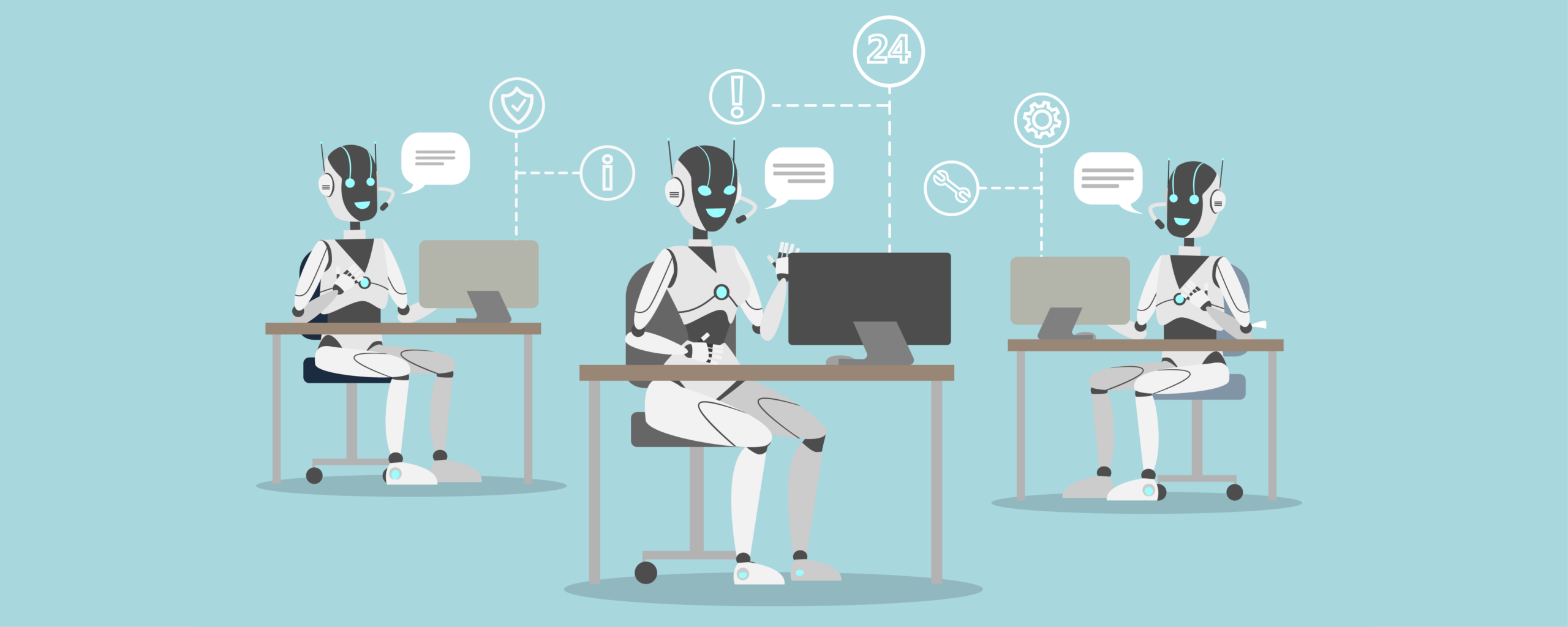Why Customer Service Employees shouldn’t be afraid of chatbots

By 2021 15% of all customer service interactions worldwide will be handled completely by AI. Does this prediction by Gartner, the world’s leading research and advisory company, mean that customer service employees have to worry for their jobs? Will they soon be replaced by robots and become redundant – just like we have witnessed in other industries where machines took over human work? Or can customer service agents, on the contrary, even benefit from these developments in their field?
Chatbots at the helm
It is almost certain that in the coming years chatbots will play a major role in the contact between consumers and companies.
“Chatbot technology is easily accessible, even for small and medium-sized businesses. If we believe Gartner’s forecast, we will see many more successful chatbot applications in practice in the coming years,” says Alexander de Ruiter, CEO at Spotler Engage.
There are numerous possible applications for chatbots and customer service is currently the largest domain for chatbots. Whether it’s product and style advise through live chat applications of online retailers, support to find the right flight or hotel on holiday booking sites or the answering of standard customer service questions, chatbots are ready to assist. The virtual assistants can be perfectly integrated into all digital customer service channels such as Facebook Messenger, Twitter and live chat. Additionally chatbots can also take over tasks in the background, such as automatically tagging messages or routing them to the right employee.
Are chatbots making humans redundant in customer service?
In some cases, chatbots can solve entire cases on their own without the intervention of a human colleague. In addition, thanks to artificial intelligence, modern bots become smarter by the day. They learn and improve with every customer contact. Does this mean that sooner or later we will be able to completely do without human resources in customer service? Alexander de Ruiter, CEO of Spotler Engage with 25 years of experience in customer service, answers with a clear “no”.
“Although bots are becoming more intelligent, we believe that the human workforce will continue to be necessary. Robots will not be able to replace humans. However, the content of the work will change and new positions will emerge.”
Afterall, somebody needs to manage the chatbot and make sure it performs well. And who would be better suited for that job, then customer service agents themselves?
“With your customer service agents you already have people in place that understand how to have conversations with customers. With an easy-to-use platform you can empower employees to automate solutions themselves”.
Gartner even predicts that “by 2022, 70% of white-collar workers will interact with conversational platforms on a daily basis.”
Read all about why customer service agents are the ideal chatbot developers in this article.
3 good reasons why humans are irreplaceable in customer service
When in direct contact with customers, chatbots are mostly suitable for answering simple routine questions and for obtaining missing information, like an order number. The great added value here is their responsiveness and their 24/7 availability. For complex cases, however, chatbots lack the necessary empathy. The objective, factual answer of a chatbot is not suitable for all situations. Empathy and sensitivity are needed to truly understand customers, respond to them and meet their needs.
“The bot is for efficiency, the employee for empathy. Because of this effectiveness, a bot creates a better customer experience.” Alexander de Ruiter, CEO at Spotler Engage
2. Complex situations require human-to-human interaction
Depending on the situation, individual solutions have to be found that require creativity and out-of-the-box thinking from the customer service staff. Rules and standard procedures cannot always be followed to solve a case in the best possible way. Customer service employees have more “freedom” here than a chatbot who has to adhere to predefined business rules in order to function.
3. The best results are achieved through collaboration between people and bots
Chatbots can filter information from large amounts of data and systems in seconds and make it available to their human colleagues. In addition, they can independently answer routine questions and prepare answers. In this way, the workload of customer service employees is reduced so that they can take more time for individual customers and help them out the best possible way. By shifting the focus from answering routine questions to more complex cases, the work of customer service agents becomes more meaningful and interesting, as Alexander de Ruiter explained in a recent interview:
“They don’t have to worry about answering standard questions anymore. This means they have more time to focus on the bigger problems, so that they can assist a customer more extensively if he or she has a complex question.”
You shouldn’t ignore the worries of your customer service staff when it comes to automation, but openly communicate about the sense and purpose of a chatbot. It’s important to make clear that chatbots are not a competition, but will in the long run make work easier and increase satisfaction – not only among customers, but also among employees. Customer service employees can unleash their full potential and focus on the core of their work: Interact with customers and provide assistance in solving complex problems, rather than wasting your energy on simple routine issues. And on top of that they can learn new skills by taking over responsibility for the chatbot and playing a major role in the development and optimization process.